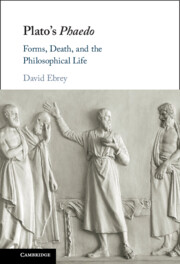Book contents
- Plato’s Phaedo
- Plato’s Phaedo
- Copyright page
- Dedication
- Contents
- Acknowledgments
- Introduction
- 1 The Characters
- 2 The Phaedo as an Alternative to Tragedy and Socrates as a Poet
- 3 Defense of the Desire to Be Dead
- 4 Cebes’ Challenge and the Cyclical Argument
- 5 The Recollecting Argument
- 6 The Kinship Argument
- 7 The Return to the Defense
- 8 Misology and the Soul as a harmonia
- 9 Socrates’ Autobiography
- 10 Cebes’ Objection and the Final Argument
- 11 The Cosmos and the Afterlife
- 12 The Death Scene
- Bibliography
- Index Locorum
- Index
11 - The Cosmos and the Afterlife
107c–115a
Published online by Cambridge University Press: 02 February 2023
- Plato’s Phaedo
- Plato’s Phaedo
- Copyright page
- Dedication
- Contents
- Acknowledgments
- Introduction
- 1 The Characters
- 2 The Phaedo as an Alternative to Tragedy and Socrates as a Poet
- 3 Defense of the Desire to Be Dead
- 4 Cebes’ Challenge and the Cyclical Argument
- 5 The Recollecting Argument
- 6 The Kinship Argument
- 7 The Return to the Defense
- 8 Misology and the Soul as a harmonia
- 9 Socrates’ Autobiography
- 10 Cebes’ Objection and the Final Argument
- 11 The Cosmos and the Afterlife
- 12 The Death Scene
- Bibliography
- Index Locorum
- Index
Summary
Socrates provides here an eschatological account that is thoroughly integrated into a novel cosmology. I argue that the Phaedo’s cosmology draws on and reflects the account of forms and ordinary objects that Socrates presented over the course of the Phaedo. The result is a distinctly Platonic account of the cosmos and the afterlife, one that treats the best parts of the cosmos as form-like and the worst parts as the source of flux. How we live now determines whether after death we will live in a more form-like or flux-like area; this dwelling, in turn, determines whether our souls are benefited or harmed in the afterlife. Since Socrates does not suggest in the Phaedo that any god is responsible for the cosmos, I argue that he avoids needing to explain why our souls can be harmed in the afterlife. In the secondary literature, this section of the dialogue is universally called “the myth,” which has led to treating the entirety of his account as having the same epistemic status. I argue instead that the account has five distinct stages, only the fifth of which Socrates calls a “myth” (muthos).
Keywords
- Type
- Chapter
- Information
- Plato's PhaedoForms, Death, and the Philosophical Life, pp. 275 - 298Publisher: Cambridge University PressPrint publication year: 2023



